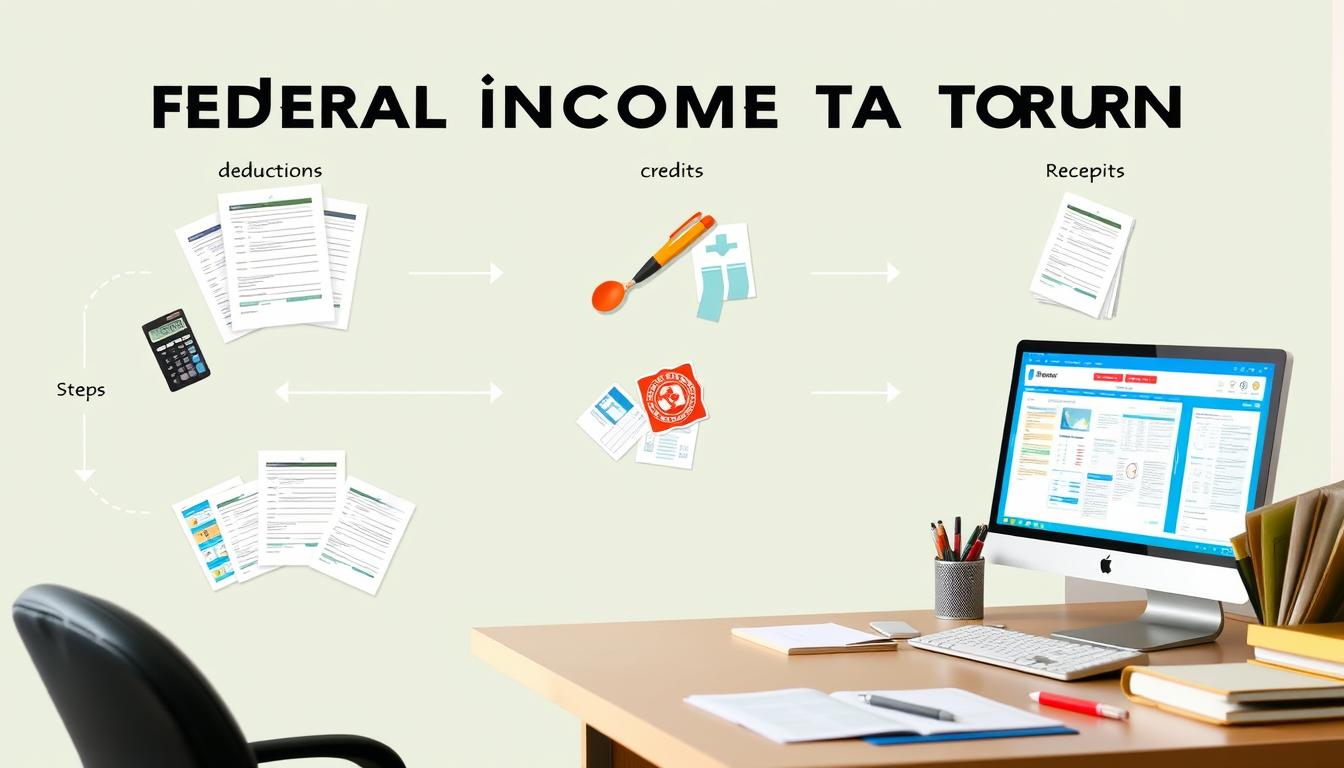Did you know professionals with a master’s in taxation earn about $96,000 yearly? This info comes from Payscale and shows the high potential of furthering your education in taxation1. Every year, over 200,000 people get a master’s degree in business, with many focusing on taxation1. This guide is here to help you learn about U.S. taxes in a simple way. It covers tax filing, deductions, and understanding complex laws. Our goal is to give you a firm grasp on tax rules.
Key Takeaways
- Understanding taxation is critical for effective financial management.
- A master’s in taxation can lead to a rewarding career and significantly higher salaries.
- Tax filing and deductions are key components in reducing your overall tax liability.
- Professional programs offer varying formats, including online and residential options, for flexibility.
- Networking through alumni and organizations can enhance your career prospects.
- Staying informed about emerging trends is vital for success in the field of taxation.
Introduction to Taxation in the United States
Taxes are key to the U.S. government’s operation. They pay for crucial services and projects that help everyone. Learning about taxes is the start of understanding your financial duties in the U.S.
The U.S. tax system includes federal and state taxes. Federal tax rates range from 10% to 37% of your income2. Property taxes differ by state, with rates from 0.2% to 1.9%2.
All income types, like wages and dividends, must be reported. This rule applies to U.S. citizens and residents. The complex tax code spans over three million words, making tax time a big task34.
It’s also crucial to know the differences between tax types. Federal taxes are widely discussed, but state taxes can greatly affect your finances. State taxes can range from 0% to 13.30%2. Understanding these details can help you manage your money well.
Why Understanding Taxation is Essential for Your Finances
Understanding how taxes work is key to smart financial choices. This is true for both personal budgets and business plans. The importance of taxation is not just about following rules; it also greatly influences your financial planning. Knowing how taxes affect your decisions helps you create better investment plans and budgets.
Impact on Personal and Business Decisions
Taxes are important in making financial choices. When you’re looking to buy a house or invest in a business, you need to think about the taxes involved.
Tax cuts enacted have been a significant factor contributing to the high and rising deficits in the U.S. economy
5 Lenders also look at your tax returns from the past three years before giving a loan. This shows how knowing about taxes can influence how much you can borrow6.
Long-Term Financial Planning
Considering taxes in your long-term finances is crucial for a healthy financial future. The budget forecast for the next ten years has worsened significantly, from a $5.6 trillion surplus to a nearly $3 trillion deficit. This shows the need for careful planning5. Regular tax document reviews improve your financial records. This helps make better business choices. An annual check can show where you can get better and ensure your plans meet the current tax laws6.

| Tax Implication | Impact on Financial Decisions |
|---|---|
| Property Purchases | Influences mortgage interest rates and tax deductions |
| Investment Choices | Affects capital gains taxes and long-term growth |
| Loan Approvals | Tax return history impacts lender confidence |
| Business Planning | Facilitates better expense tracking and deductions |
By getting to know these tax effects, you’re set to make strategic, informed financial choices56.
Types of Taxes in the United States
It’s key to know the different taxes in the United States for your finance management. There are federal taxes, state and local taxes, and specific ones like sales and property tax. Each tax type is crucial for the federal tax system, helping fund government services.
Federal Taxes
The main parts of the federal tax system are income and payroll taxes. In the fiscal year ending in October 2023, the government collected $4.439 trillion in taxes, a drop from the previous year’s $4.9 trillion by $457 billion7. Income tax made up 42.1% of this, showing it’s a major government revenue source7.
Payroll taxes, for things like Social Security and Medicare, brought in about $1.3 trillion. This was 32.5% of federal revenues in 20217.
State and Local Taxes
State and local taxes differ a lot across the U.S. Most states have sales taxes, except a few like Alaska and Delaware8. In 2024, Louisiana recorded the highest average state and local sales tax at 9.56%9. Local taxes can increase the total tax burden, affecting how people shop and make economic choices.
Sales and Property Taxes
Sales tax applies to goods and services, and property tax to real estate. Property tax rates vary, with New Jersey at the high end with a 2.08% rate and Hawaii at the low end with 0.26%9. Sales tax rates also vary, even within the same state. Places like Sterlington and Monroe in Louisiana can have a combined rate of 12.95%7.
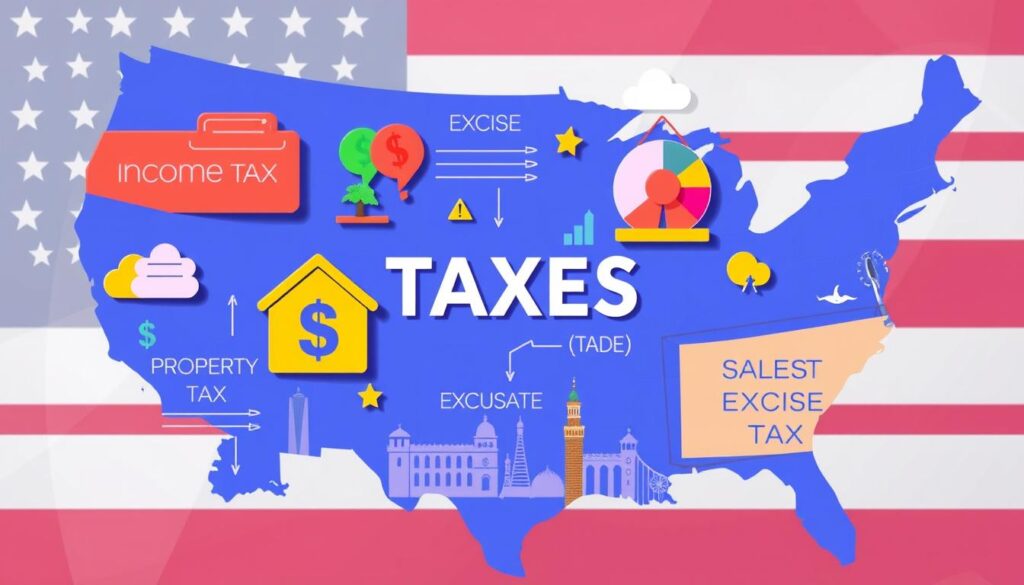
The Tax Filing Process Explained
Filing your taxes can be easy if you know the steps. First, gather all your important tax documents. This includes your W-2 forms, which show your income, and any receipts for deductions. These documents prove your claims and make sure your tax return is right.
Gathering Documentation
It’s important to collect the correct documents when filing taxes. You’ll need:
- W-2 forms from employers
- 1099 forms for other income
- Receipts for deductible expenses
- Bank statements and investment income statements
- Last year’s tax return for reference
Being organized with these papers helps make filing easier. Using the IRS Free File lets most people file electronically at no cost10.
Choosing the Right Tax Form
Choosing the right tax form is key. Your options include the 1040, 1040A, or 1040EZ, depending on your money situation. For example, the 1040 is detailed for those who itemize deductions. The 1040EZ fits simpler returns. In 2021, standard deductions went from $12,550 for singles to $25,100 for married couples filing together11.
Know what credits you can get. The Interactive Tax Assistant (ITA) helps figure out what tax credits and deductions you’re eligible for. Need help? Tax pros like CPAs can guide you through the process10.
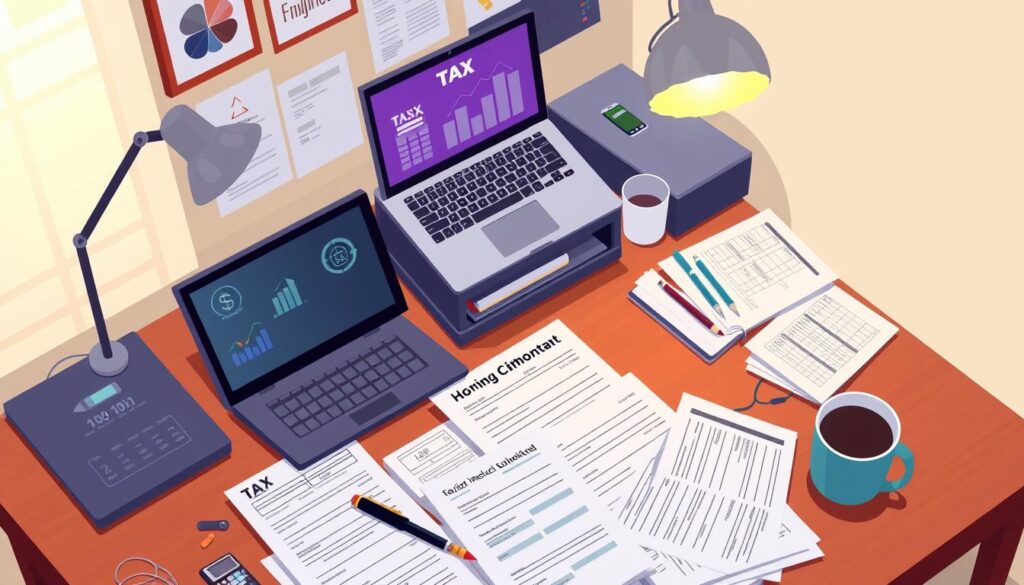
Tax Deductions and Credits: What You Need to Know
Knowing the difference between tax deductions and tax credits is key for better tax returns. Tax deductions lower how much of your income gets taxed. Meanwhile, tax credits cut down the tax amount you actually owe. Both can greatly help you save money during tax time.
Common Deductions
Here are a few tax deductions that could decrease your taxes:
- Mortgage interest: Homeowners may deduct their mortgage interest, leading to big savings.
- Student loan interest: You can cut your taxable income by up to $2,500 for student loan interest.
- Business expenses: Costs from using your car or home for business are deductible.
- Education costs: Teachers can save by deducting certain educational expenses.
In 2023, the standard deduction is $13,850 for singles or those married but filing separately. It’s $27,700 for married couples filing together or qualifying surviving spouses, and $20,800 for heads of households12. Note, some folks, like certain nonresidents, can’t use the standard deduction. This fact underlines the need to know which deductions you qualify for12.
Understanding Tax Credits
Tax credits also play a big part in better tax returns. Take the Child Tax Credit, for instance, which gives $2,000 for each eligible child under 1713. Many can get credits for life events like adopting a child or spending on childcare. If you don’t owe any taxes, refundable credits might even give you cash back. This is especially valuable for people with lower incomes12.
Maximizing Your Savings
To save the most, consider itemized deductions if they’re higher than the standard deduction. This means listing expenses like charity donations, medical costs, and losses from thefts or disasters12. By carefully checking your situation and using all deductions and credits available to you, you can lower your tax bill a lot.
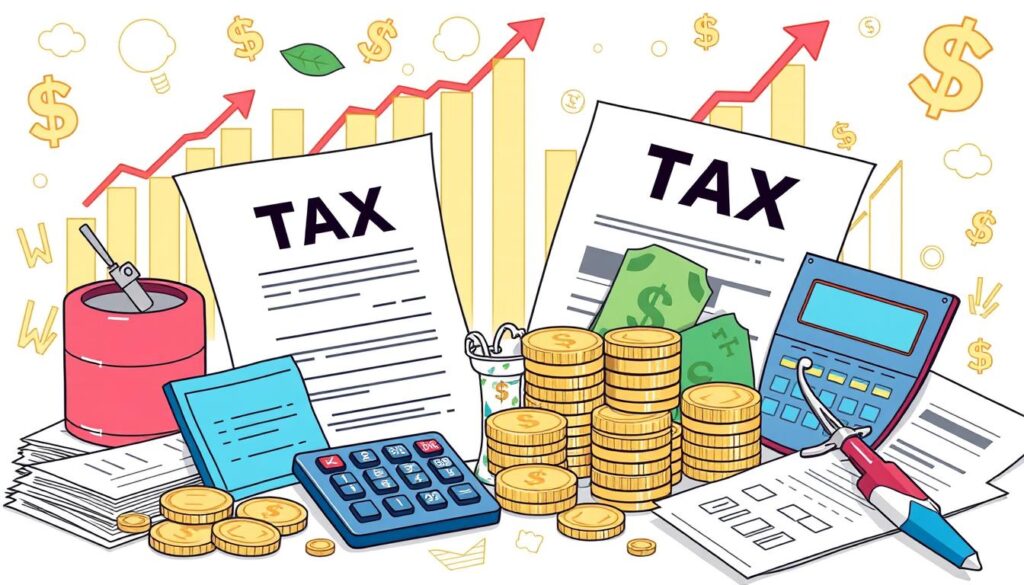
Mastering Tax Law in the United States
Getting to know tax law in the U.S. is key for navigating its financial system. You’ll run into various federal rules that detail taxes for people and businesses. The IRS makes sure these laws are followed, playing a key part in the tax process.
Understanding Federal Tax Regulations
Federal tax rules are complicated and govern how money, business gains, and other income get taxed. The latest U.S. Master Tax Guide® (2024) reflects updates, including COVID-19 relief and changes for 2023 taxes14. It’s vital for understanding the depth of federal tax law, offering help on many tax situations14.
The Role of the Internal Revenue Service (IRS)
The IRS is at the heart of enforcing tax laws and ensuring everyone pays their share. It provides resources and advice to help taxpayers and companies know what they owe. Experts who contribute to resources like the U.S. Master Tax Guide have professional credentials, showing their deep understanding of tax laws14
Taxation in the United States: Key Concepts
Getting the hang of tax concepts is key to understanding U.S. taxes. One crucial part is taxable income. It’s what you’re taxed on, and figuring it out helps manage your money.
Taxable Income
Taxable income means all you make, from jobs to investments, after deductions. For 2023, single folks are taxed 37% on earnings over $578,126. Learning about taxable income helps avoid surprises with your taxes15. Married couples filing together see the same rate for incomes over $647,85115. Knowing these limits is very important.
Effective vs. Marginal Tax Rates
When talking about tax rates, it’s important to know the difference between effective and marginal rates. The effective rate is your average tax rate. The marginal rate is what your last dollar gets taxed at. Some might be in a 37% bracket but pay less on average because of deductions15. Also, U.S. companies now have a 21% tax rate, down from 35%, impacting their taxes16.
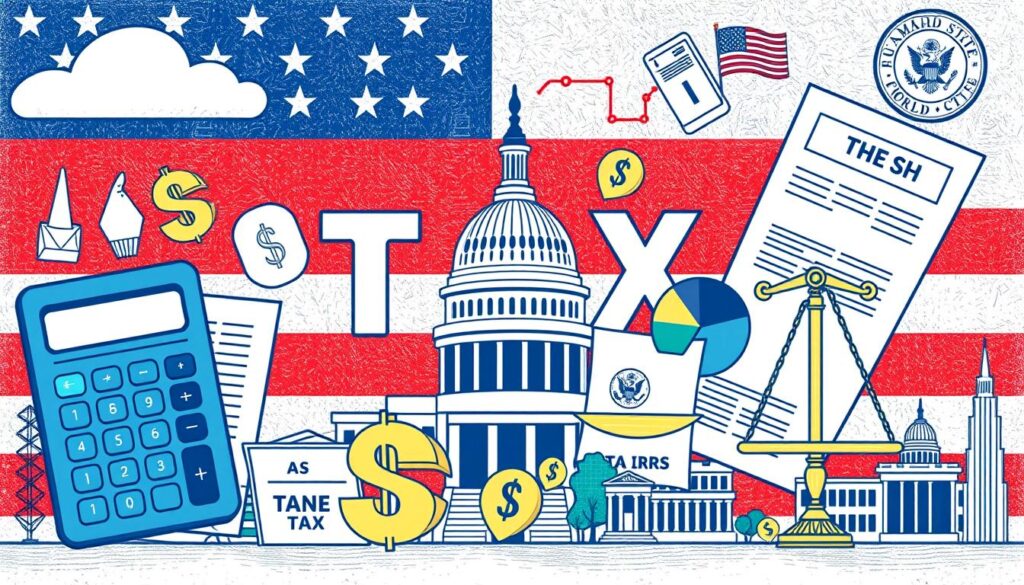
| Taxpayer Type | Tax Rate Thresholds (2023) | Key Notes |
|---|---|---|
| Single Taxpayers | 37% on income over $578,126 | Example of marginal tax rate application |
| Married Filing Jointly | 37% on income over $647,851 | Higher income threshold for joint filing |
| Head-of-Household | 37% on income over $578,101 | Similar to single filers but with different filing status |
Knowing these tax rates helps you make smart money moves. It’s key to managing your finances well1516.
Available Resources for Learning About Taxation
Finding good resources can greatly help you understand taxes better. You have many choices to learn more, including online courses and government guides. These options are great for learners at all levels, helping you get through the tax maze.
Online Courses and Certifications
Online courses let you learn about taxes at your own speed. They often come with certificates, boosting your personal growth or career. A good chunk of people, about 34.7%, get expert help for tax preparation17. Also, 42.5% look for advice on how to file and pay taxes17. If you made $79,000 or less in 2023, you can use free software from places like H&R Block and TurboTax through the IRS Free File website18.
Government Resources and Publications
The IRS has a lot of helpful guides on taxes. These publications give important advice for different tax situations. If your income meets certain criteria, free tax prep help is available through programs like VITA and TCE. In fact, 54.9% of taxpayers can get free assistance17. Plus, the IRS Direct File pilot lets eligible folks file their federal taxes for free next year18.

The Benefits of a Master’s Degree in Taxation
Getting a Master’s in Taxation boosts your career and leads to high-paying jobs. It makes you stand out because more companies want tax experts now. Graduates often land top jobs at big firms and government spots by studying at places like the University of New Haven19.
Career Opportunities in Taxation
A Master’s in Taxation opens up many job opportunities. People with this degree work at:
- Big Four international accounting firms
- Corporate tax departments
- Government agencies like the Internal Revenue Service (IRS)
This degree helps you move up faster in your career, unlike having just a bachelor’s degree20.
Preparation for CPA Certification
A Master’s in Taxation prepares you for the CPA exam too. It includes courses that meet CPA exam requirements. Schools like Bentley have courses and electives for your interests20.

Expert teachers help you learn about federal taxation and tax practice. This prepares you for the CPA and for working in taxation.
The knowledge from a Master’s in Taxation boosts your job chances. It leads to big career growth in a field that keeps changing19.
Choosing the Right Taxation Degree Program
Picking the right taxation degree program is a big step towards your career goals. It’s key to know what to look for in a program. Consider tuition costs, how long the program is, and if the school is accredited.
Factors to Consider When Selecting a Program
There are a few things to keep in mind when looking at taxation degree programs:
- Duration: Master’s in Taxation typically take 1-2 years of full-time study. This helps you graduate quicker21.
- Cost: Costs range from $20,000 to $40,000 on average. This is a big factor in choosing a program21.
- Admission Requirements: Schools often ask for a minimum 3.0 GPA. More competitive ones might want a higher GPA21.
- Delivery Format: Look for programs that offer online or hybrid classes. This gives you more flexibility with your time21.
- Career Impact: Having a master’s degree usually means a higher salary. It’s better than just a bachelor’s in taxation21.
- Recommendations: Recommendations from teachers or professionals are often needed. They make your application stronger21.
Accredited Schools Offering Taxation Degrees
Choosing an accredited institution for your taxation degree is important. Accreditation means the education you get is recognized for its quality. Graduates can work as Tax Accountants, Analysts, or Managers21. Those wanting to be CPAs will find M.Tax and MAC degrees useful. M.Tax focuses on taxes, while MAC degrees offer wider skills for different roles22.

Popular Courses in Taxation Programs
Taking specialized tax classes sharpens your understanding and prepares you for the real world. These programs include a range of topics. They add crucial foundational and advanced knowledge for any tax professional.
Tax Research and Professional Practice
Tax research is a key skill for understanding tax laws. Courses on this topic teach you how to examine tax codes and create research methods. This knowledge helps make better decisions in tax-related issues.
International Taxation
International tax courses teach about global tax systems. You learn about tax treaties and rules for U.S. businesses abroad. These classes get you ready for challenges in a global economy.
Wealth, Transfers, Trusts, and Estates
This topic is about taxes on wealth transfers, trusts, and estates. It explains estate planning, probate, and managing tax bills. With these courses, you can handle wealth management’s complex aspects.

Popular courses in taxation programs build a broad set of skills. Enrolling in these programs makes you ready for many taxation challenges. You’ll have education and experience to guide your career to success232425.
Career Paths in Taxation
Exploring careers in taxation opens the door to varied and fulfilling opportunities. Each role requires specific skills. Working in taxation mixes analysis and advice, important for both companies and people.
Corporate Tax Management
Corporate tax roles focus on managing a company’s tax strategies and compliance. They work on tax efficiency. Professionals usually have a bachelor’s in accounting or similar fields. Employers often want a master’s degree. A CPA license boosts career options, helping handle complex taxes effectively26. Tasks include handling mergers, advising on international taxes, and following regulations. Opportunities are wide, in areas like Financial Services and State and Local Tax, ensuring steady demand for experts27.
Tax Consulting and Advisory Roles
Tax consultants offer strategic advice to optimize clients’ tax positions. This role demands deep tax law knowledge and analytical ability. Starting typically requires a bachelor’s degree. Advancement may come with a master’s or CPA license26. Focus areas can be International Tax Services and Mergers and Acquisitions Tax. Here, professionals help with cross-border deals and restructuring27. These roles often lead to earnings well above the tax accountant average salary of about $61,07026.
IRS Administrative Positions
The IRS offers roles in compliance and tax law enforcement. These positions value a public service mindset and relevant education, like accounting degrees. IRS workers aim to enhance compliance and shape tax policy. Currently, over 1.4 million accountants work in the U.S., many in tax accounting28. Rising in the IRS can lead to tackling global corporate tax issues and policy changes. This greatly impacts the nation’s tax system27.
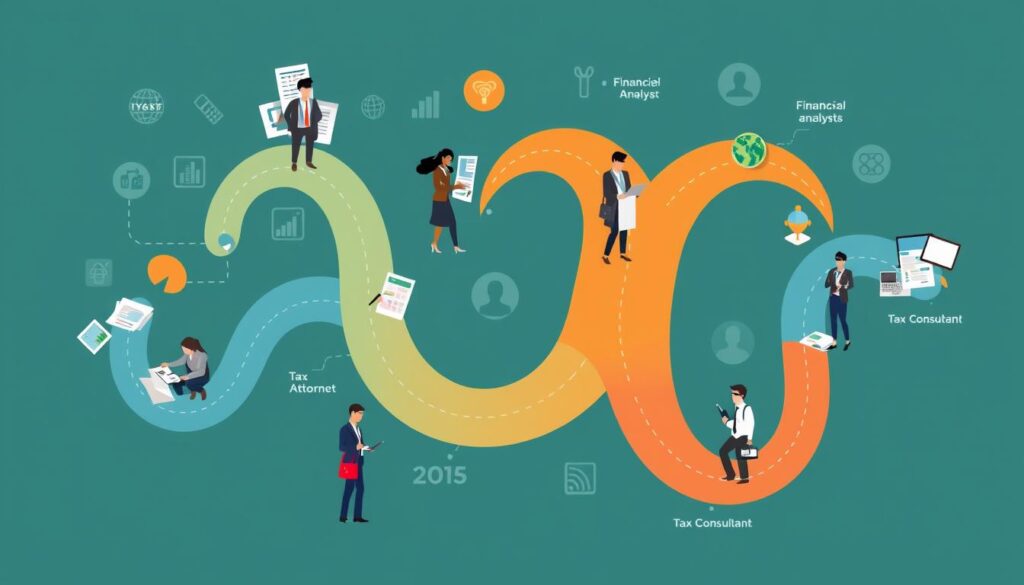
Challenges You May Encounter in Taxation
Dealing with taxes involves big hurdles for both people and companies. Knowing these issues helps avoid trouble with tax rules. It makes the complex world of taxes easier to understand.
Complex Tax Laws
The tax laws in the US are complex and always changing. They apply to all US citizens and residents, no matter where they live. This can make things hard for those living in other countries29. The US also has tax agreements with 66 countries. These agreements can be beneficial but are hard to use without deep knowledge29.
Difficulties in Compliance
Following these complex rules can be hard. For those living overseas, getting help from the IRS is tough, except in Puerto Rico29. Also, the detailed IRS rules mean people often need expert help, which can be expensive and rare29.

To manage the complexity of tax law, it’s vital to keep up with latest updates. Seeking expert advice when needed is smart. Being ready for these issues can make dealing with taxes much smoother.
| Challenge Type | Description | Potential Solutions |
|---|---|---|
| Complex Tax Laws | These laws are intricate and continually changing, often leading to confusion. | Regularly consult the IRS website and stay updated on tax news. |
| Compliance Issues | Struggles arise from intricate regulations and limited access to assistance. | Consider hiring experienced tax professionals familiar with international tax laws. |
Being proactive and informed helps you navigate through tax challenges better30.
The Future of Taxation in the United States
The world of taxes is changing fast, thanks to new technology and trends. People and experts in taxes need to keep up with these changes. Now, we see more use of automated software for taxes. This software helps do things faster and makes fewer mistakes in tax reports.
Technology and Taxation
Tax tech is making tax systems better. In three years, tax revenue went up by 38%, adding $152 billion more than before the pandemic. Using automated systems is crucial for dealing with complex tax laws. For example, 25 states have lowered taxes on individuals’ income since 2021. Also, 13 states have reduced taxes on businesses3132. This shows how important it is to have tech that can keep up with fast changes in taxes.
Emerging Trends
New trends in taxes could change policies and financial plans. State revenues went up by $403.6 billion by the end of 2022, 40% more than their usual growth31. During this time, 48 states made tax cuts or gave one-time rebates, helped by federal aid. It’s important to watch how steps like full expensing and ending certain taxes are reshaping U.S. taxes32.

As states deal with these changes, knowing and using tax tech is key. It helps make sure they follow the rules and are as efficient as possible.
| State | Individual Income Tax Cuts | Corporate Income Tax Cuts |
|---|---|---|
| Arkansas | 4.7% (2023) | 5.1% (2023) |
| Indiana | 3.05% (2024), 2.9% (2027) | Reduced in 2023 |
| Mississippi | Scheduled Reduction | Scheduled Reduction |
| North Carolina | Scheduled Reduction | Scheduled Reduction |
Practical Tips for Managing Your Taxes
Handling taxes doesn’t have to be hard if you use the right tips. Good tax management is key for keeping your money in check. Here are some useful steps to help you handle tax intricacies better.
Organizing Your Financial Documents
Start by getting your financial documents in order. Put all your income statements, receipts, and tax forms in one spot. Here’s a checklist to help you out:
- W-2 forms from your employers
- 1099 forms for freelance work or other income
- Receipts for things you can deduct, like work expenses or health costs
- Info on property taxes and mortgage interest
- Puttings into retirement funds
Consulting with Tax Professionals
Talking to tax pros can really help your filing process. They know a lot about getting deductions and credits. You might need a pro when:
- Things get complicated, like starting a business
- Big life changes happen, such as getting married or having a kid
- You’re not sure how tax law changes affect you
Pros also make sure you follow the latest tax laws, saving you time and money. For example, using certain strategies can lower your tax bill. Make sure you know the current rules for adding to retirement accounts, like the $23,000 limit for 401(k)s in 2024. This is crucial for smart tax planning3334.

Conclusion
Understanding the U.S. tax system is crucial for your money’s health. This guide has covered the basics of taxes. It talked about the importance of knowing taxes for your personal and business money matters. Knowing what taxes apply to you and how to file them is key to being prepared.
There are also great career chances in the tax field. These jobs can be very rewarding, from managing a company’s taxes to giving advice. As you think about your financial future, remember good strategies and resources make things easier. With the insights from this guide, you’re ready to handle taxes better.
So, if you’re paying taxes or want to work in the field, learning about the U.S. tax code is important. Keep what you’ve learned here in mind for the future. It will help you be ready for tax time. And remember, knowing more about taxes gives you power3536.
FAQ
What is the main purpose of taxation in the United States?
What types of taxes can I expect to pay?
How can I simplify the tax filing process?
What’s the difference between tax deductions and tax credits?
Why should I consider advanced education in taxation?
What resources can help me learn more about taxation?
What should I look for when choosing a taxation degree program?
What are some common challenges in navigating taxation?
How is technology influencing the field of taxation?
What strategies can I use to organize my tax documents?
Source Links
- Top MS in Taxation 2025 | Accounting.com – https://www.accounting.com/degrees/taxation/masters/best-programs/
- Taxation in the United States – https://en.wikipedia.org/wiki/Taxation_in_the_United_States
- Taxation of U.S. Residents | Internal Revenue Service – https://www.irs.gov/individuals/international-taxpayers/taxation-of-us-residents
- The overall system of taxation in the United States is progressive – https://www.bu.edu/eci/files/2019/06/Taxes_in_the_United_States.pdf
- Good Reasons for Taxes – https://www.brookings.edu/articles/good-reasons-for-taxes/
- The Importance of Understanding Your Tax Information – https://extension.psu.edu/the-importance-of-understanding-your-tax-information
- Types of Taxes – Income, Property, Goods, Services, Federal, State – https://www.debt.org/tax/type/
- The Three Basic Tax Types – https://taxfoundation.org/taxedu/educational-resources/primer-the-three-basic-tax-types/
- Taxes Definition: Types, Who Pays, and Why – https://www.investopedia.com/terms/t/taxes.asp
- Get ready to file your taxes – https://www.irs.gov/individuals/get-ready-to-file-your-taxes
- How to Do Taxes: A Step by Step Guide | Accounting.com – https://www.accounting.com/resources/how-to-do-taxes/
- Credits and deductions for individuals – https://www.irs.gov/credits-and-deductions-for-individuals
- Tax Deductions and Credits – https://www.investopedia.com/tax-deductions-and-credits-4689689
- U.S. Master Tax Guide® (2024) – https://shoptax.wolterskluwer.com/en/us-master-tax-guide-2024.html
- United States – Individual – Taxes on personal income – https://taxsummaries.pwc.com/united-states/individual/taxes-on-personal-income
- The U.S. Corporate Tax System Explained – https://pgpf.org/article/the-us-corporate-tax-system-explained/
- Resources to Help You Prepare Your Tax Return and Resolve Tax Disputes – https://www.irs.gov/newsroom/resources-to-help-you-prepare-your-tax-return-and-resolve-tax-disputes
- 9 Sources for Free Tax Help – https://www.investopedia.com/articles/tax/09/sources-free-tax-help.asp
- Why You Need an M.S. in Taxation – University of New Haven – https://www.newhaven.edu/business/graduate-programs/taxation/whitepaper.php
- Graduate MST Article: What Can You Do With a MST? – https://www.bentley.edu/academics/graduate-programs/masters-taxation/what-can-you-do-masters-taxation
- Getting a Master’s in Taxation: Everything You Need to Know – https://www.westerncpe.com/blog-post/getting-a-masters-in-taxation-everything-you-need-to-know/
- How to choose between a Master of Taxation degree vs a Master of Accounting – https://www.kenan-flagler.unc.edu/perspectives/how-to-choose-between-a-master-of-taxation-degree-vs-a-master-of-accounting/
- Best Taxation Courses & Certificates [2025] | Coursera Learn Online – https://www.coursera.org/courses?query=taxation
- Master of Science in Taxation (TAX) – About This Program | Tseng College – https://tsengcollege.csun.edu/programs/TAX
- M.S. in Taxation – Loyola Marymount University – https://cba.lmu.edu/academics/grad/taxation/
- Tax Accountant Career Path | Accounting.com – https://www.accounting.com/careers/tax-accountant/how-to-become/
- Careers in Tax Services – https://www.pwc.com/us/en/careers/why-pwc/what-we-do/what-we-do-tax.html
- Tax Law & Accounting: Advance Your Career | Loyola Law School Online – https://online.lls.edu/how-to-advance-your-accounting-career/
- The Dizzying Tax Challenges for U.S. Citizens or Residents Living Abroad – https://www.taxpayeradvocate.irs.gov/news/nta-blog/the-dizzying-tax-challenges-for-u-s-citizens-or-residents-living-abroad/2024/04/
- Major tax issues in 2017 – https://www.brookings.edu/articles/major-tax-issues-in-2016-2/
- How a Pandemic-Era Surge in Tax Collections Drove a Revenue Wave—and What It Means for Future State Budgets – https://www.pewtrusts.org/en/research-and-analysis/issue-briefs/2024/08/how-a-pandemic-era-surge-in-tax-collections-drove-a-revenue-wave
- State Tax Reform and Relief Trend Continues in 2023 – https://taxfoundation.org/research/all/state/state-tax-reform-relief-2023/
- Top 8 Year-End Tax Tips – https://turbotax.intuit.com/tax-tips/tax-planning-and-checklists/top-8-year-end-tax-tips/L5szeuFnE
- 9 Tax Tips That Could Save You Money on Your Taxes – https://www.ml.com/articles/tax-tips-that-could-save-you-money.html
- How Do Tax Policies Affect Individuals and Businesses? – https://siepr.stanford.edu/publications/policy-brief/how-do-tax-policies-affect-individuals-and-businesses
- The relationship between taxation and U.S. economic growth – https://equitablegrowth.org/the-relationship-between-taxation-and-u-s-economic-growth/

